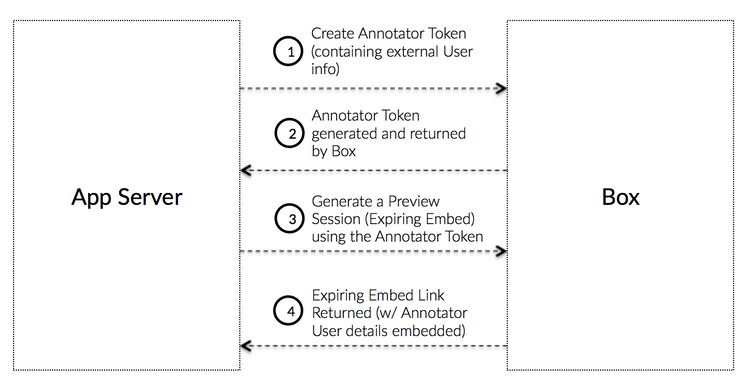Annotator Tokens
Annotator Tokens
Annotations is one of the key features supported by new Box View, that allows developers to provide collaboration capabilities right from within the embedded Box preview in their application.
Box View supports three annotation types: highlight only, highlight annotation, and point annotation. Annotations are only supported on document and image previews.
What is an Annotator Token
An Annotator Token is an Access Token that allows an application to create a Preview Embed Link for a file that a user can make annotations on. As an application might not create a new App User for every one of the application's users, the Annotator token allows the application to track which of their own users made the annotations.
The Annotator Token is used instead of a regular Access Token, App Token, or File Token to generate a preview session (an expiring embed link) that is linked to a unique user ID and display name.
External user info
The external display name associated with an annotation is essentially a stateless "label" appended to the annotation. This means that once an annotation has been added, the display name is permanently associated with the annotation and cannot be updated unless the annotation is deleted and added again with the updated display name.
Create without SDKs
To create an annotator token, follow the instructions for manually authenticating through JWT but replace the JWT claim with the following data.
var claims = new List<Claim>{
new Claim("sub", '[EXTERNAL_USER_ID]'),
new Claim("name", '[EXTERNAL_USER_DISPLAY_NAME]'),
new Claim("box_sub_type", "external"),
new Claim("jti", jti),
};
JwtClaims claims = new JwtClaims();
claims.setIssuer(config.boxAppSettings.clientID);
claims.setAudience(authenticationUrl);
claims.setSubject("[EXTERNAL_USER_ID]");
claims.setName("[EXTERNAL_USER_DISPLAY_NAME]");
claims.setClaim("box_sub_type", "external");
claims.setGeneratedJwtId(64);
claims.setExpirationTimeMinutesInTheFuture(0.75f);
claims = {
'iss': config['boxAppSettings']['clientID'],
'sub': '[EXTERNAL_USER_ID]',
'name': '[EXTERNAL_USER_DISPLAY_NAME]',
'box_sub_type': 'external',
'aud': authentication_url,
'jti': secrets.token_hex(64),
'exp': round(time.time()) + 45
}
let claims = {
iss: config.boxAppSettings.clientID,
sub: "[EXTERNAL_USER_ID]",
name: "[EXTERNAL_USER_DISPLAY_NAME]",
box_sub_type: "external",
aud: authenticationUrl,
jti: crypto.randomBytes(64).toString("hex"),
exp: Math.floor(Date.now() / 1000) + 45
};
claims = {
iss: config['boxAppSettings']['clientID'],
sub: "[EXTERNAL_USER_ID]",
name: "[EXTERNAL_USER_DISPLAY_NAME]",
box_sub_type: 'external',
aud: authentication_url,
jti: SecureRandom.hex(64),
exp: Time.now.to_i + 45
}
$claims = [
'iss' => $config->boxAppSettings->clientID,
'sub' => '[EXTERNAL_USER_ID]',
'name' => '[EXTERNAL_USER_DISPLAY_NAME]',
'box_sub_type' => 'external',
'aud' => $authenticationUrl,
'jti' => base64_encode(random_bytes(64)),
'exp' => time() + 45,
'kid' => $config->boxAppSettings->appAuth->publicKeyID
];
| Parameter | Type | Description |
|---|---|---|
sub | String | The external user ID to tie this annotation to. This can be any arbitrary ID tracked by the application |
box_sub_type | String | external to signify an external user ID |
box_sub_type | String | The external user name to tie this annotation to. This will be displayed in the Box UI |
Then, convert this claim to an assertion according to the guide and pass this
assertion to the POST /oauth2/token
endpoint together with an existing valid Access Token, App Token, or File Token,
as well as a set of scopes, and the resource for which to create the token.
var content = new FormUrlEncodedContent(new[]
{
new KeyValuePair<string, string>(
"grant_type", "urn:ietf:params:oauth:grant-type:token-exchange"),
new KeyValuePair<string, string>(
"resource", "https://api.box.com/2.0/files/123456"),
new KeyValuePair<string, string>(
"subject_token", "[ACCESS_TOKEN]"),
new KeyValuePair<string, string>(
"subject_token_type", "urn:ietf:params:oauth:token-type:access_token"),
new KeyValuePair<string, string>(
"scope", "item_preview"),
new KeyValuePair<string, string>(
"actor_token", "[JWT_ASSERTION_FOR_ANNOTATOR_TOKEN]"),
new KeyValuePair<string, string>(
"actor_token_type", "urn:ietf:params:oauth:token-type:id_token"),
});
List<NameValuePair> params = new ArrayList<NameValuePair>();
params.add(new BasicNameValuePair(
"grant_type", "urn:ietf:params:oauth:grant-type:token-exchange"));
params.add(new BasicNameValuePair(
"resource", "https://api.box.com/2.0/files/123456"));
params.add(new BasicNameValuePair(
"subject_token", "[ACCESS_TOKEN]"));
params.add(new BasicNameValuePair(
"subject_token_type", "urn:ietf:params:oauth:token-type:access_token"));
params.add(new BasicNameValuePair(
"scope", "item_preview"));
params.add(new BasicNameValuePair(
"actor_token", "[JWT_ASSERTION_FOR_ANNOTATOR_TOKEN]"));
params.add(new BasicNameValuePair(
"actor_token_type", "urn:ietf:params:oauth:token-type:id_token"));
params = urlencode({
'grant_type': 'urn:ietf:params:oauth:grant-type:token-exchange',
'resource': 'https://api.box.com/2.0/files/123456',
'subject_token': '[ACCESS_TOKEN]',
'subject_token_type': 'urn:ietf:params:oauth:token-type:access_token',
'scope': 'item_preview',
'actor_token': '[JWT_ASSERTION_FOR_ANNOTATOR_TOKEN]',
'actor_token_type': 'urn:ietf:params:oauth:token-type:id_token'
}).encode()
let accessToken = await axios
.post(
authenticationUrl,
querystring.stringify({
grant_type: "urn:ietf:params:oauth:grant-type:token-exchange",
resource: "https://api.box.com/2.0/files/123456",
subject_token: "[ACCESS_TOKEN]",
subject_token_type: "urn:ietf:params:oauth:token-type:access_token",
scope: "item_preview",
actor_token: "[JWT_ASSERTION_FOR_ANNOTATOR_TOKEN]",
actor_token_type: "urn:ietf:params:oauth:token-type:id_token"
})
)
.then(response => response.data.access_token);
params = URI.encode_www_form({
grant_type: 'urn:ietf:params:oauth:grant-type:token-exchange',
resource: 'https://api.box.com/2.0/files/123456',
subject_token: '[ACCESS_TOKEN]',
subject_token_type: 'urn:ietf:params:oauth:token-type:access_token',
scope: 'item_preview',
actor_token: '[JWT_ASSERTION_FOR_ANNOTATOR_TOKEN]',
actor_token_type: 'urn:ietf:params:oauth:token-type:id_token'
})
$params = [
'grant_type' => 'urn:ietf:params:oauth:grant-type:token-exchange',
'resource' => 'https://api.box.com/2.0/files/123456',
'subject_token' => '[ACCESS_TOKEN]',
'subject_token_type' => 'urn:ietf:params:oauth:token-type:access_token',
'scope' => 'item_preview',
'actor_token' => '[JWT_ASSERTION_FOR_ANNOTATOR_TOKEN]',
'actor_token_type' => 'urn:ietf:params:oauth:token-type:id_token'
];
| Parameter | Description |
|---|---|
resource | An optional full URL path to the file the token should be restricted to. |
actor_token | The JWT assertion created earlier |
actor_token_type | Always set to urn:ietf:params:oauth:token-type:id_token |
Create with SDKs
To create a JWT annotator token with an SDK an application can exchange any active token for another token.
var options = {
actor: {
id: "[EXTERNAL_USER_ID]",
name: "[EXTERNAL_USER_DISPLAY_NAME"
}
};
client
.exchangeToken(
"item_preview",
"https://api.box.com/2.0/files/123456",
options
)
.then(tokenInfo => {
//=> tokenInfo.accessToken
});
